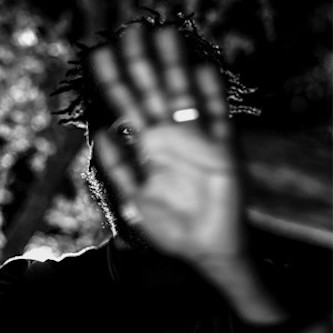Blues Album Review: Gary Clark Jr.’s “JPEG RAW” — Branching Out in New Directions
By Matt Hanson
Gary Clark Jr.‘s JPEG RAW could be seen as an orchard whose far-reaching sonic branches — nurtured by the rich, fertile, and ancient soil of the blues — stretch into jazz, hip hop, and funk.

Cover art for JPEG RAW.
In a recent appearance on The Daily Show, Gary Clark Jr. commented on how he felt like he had been “pushed into being this guy who’s going to be the savior of the blues.” He’s probably referring to things such as the great Buddy Guy knighting him as “the future of the blues.” Clark went on to point out, amiably, that “the blues is going to be fine, it’s music that will stand the test of time. Everything’s cool.” I got hip to him years ago with his mesmerizing and solidly blues-based Bright Lights and admittedly relished the idea of someone giving the blues more mainstream attention.
More fool me; that’s far too much of a burden for anyone to bear. The true value of that kind of praise is to use it as impetus to go on and do hard, and to follow wherever it leads. With his new record JPEG RAW, his sixth, Clark continues to demonstrate the fresh new directions he can take with his music.
He doesn’t abandon the blues entirely. The densely layered title track is filigreed with some lovely BB King-esque quicksilver guitar and the beat is very close to the traditional boom-bap of hip hop, with some quasi-rapping about life at street level. The title is a graffiti-like acronym for Jealousy, Pride, Envy, Greed, Rules, Alter Ego, and Worlds, which resembles a Biblical taxonomy of sins that blues musicians (and everyone else) have been grappling with forever. The raucous “Don’t Start” is a heated exchange between a cuckold and his lady, played by Valerie June, a classic blues situation if there ever was one.
There’s room for some jazz, too. “To the End of the Earth” is a brief, sweet little crooner that serves as a bit of a palate cleanser for the record’s consistently beefy, muscular tracks. “Alone Together” sprinkles a drizzle of muted trumpet over the romantic malaise — “Why do we feel so alone together?/ We should be dancing on the floor” — rendered in a woozy wail.
Eminences like Stevie Wonder and George Clinton sit in on different tracks. “What About the Children” wouldn’t be out of place on one of Wonder’s ’70s era socially conscious tracks. It sure would be nice if we could all agree, as the lyrics beseech us, to put our differences aside and prioritize working for the youth of the next generation. “Funk Witch U” is a little disapointing, given that no less than George Clinton is doing background vocals. The track never really generates the spiky rambunctiousness of P-Funk.
The record’s drumming mixes R & B and hip-hop, as with the uplifting “Triumph,” which is a set of heartfelt instructions to young people: “Know that life is not a race, take your time, slow up/ Ignite that spark inside your mind ‘til they feel it heating up.” The reflective album closer is “Habits.” Here Clark, whose songs consistently display more confidence than he himself possesses, castigates himself: “I’ve got habits that I just can’t break/ When I think about it I just start to shake.” Admitting such vulnerability is honorable. Especially given the many accolades the musician has received. But he is skeptical: “It looks good on the surface/ I need some help.” At one point, the tempo switches, from a slow loping rhythm to a determined guitar strum and then comes an almost flamenco-sounding interlude, where Clark repeats the plaintive phrase “come back my love” which a chorus intones behind him. Given the varying tones, moods, and rhythms that make up “Habits,” it comes across as a medley or a suite. You can feel someone tossing and turning, afflicted by an undefined, internal struggle as the mood grows darker. As the gnarled guitar pushes the momentum, the song is driven towards a resolution that doesn’t end up where you’d expect. Gutsy choice for a song so epic in scope — and a record closer no less.
Willie Dixon once said that “the blues is the roots and all the other music is the fruits.” Sounds right to me. So JPEG RAW could be seen as an orchard whose far-reaching sonic branches — nurtured by rich, fertile, and ancient soil — stretch into jazz, hip hop, and funk. The album is also grounded — to borrow a phrase from Cornel West — in the most important thing of all: “the blues is personal catastrophe lyrically expressed.” May Clark keep planting seeds for a long time to come.
Matt Hanson is a contributing editor at the Arts Fuse whose work has also appeared in the American Interest, the Baffler, the Guardian, the Millions, the New Yorker, the Smart Set, and elsewhere. A longtime resident of Boston, he now lives in New Orleans.

I saw Gary at Eric Clapton’s blues festival in LA and wish he could have played more. I’m from Bismarck ND and we get very few big acts. If he traveled a little closer to us I would definitely be in the audience, even though I have a limited income. Best wishes and blessings Mark F